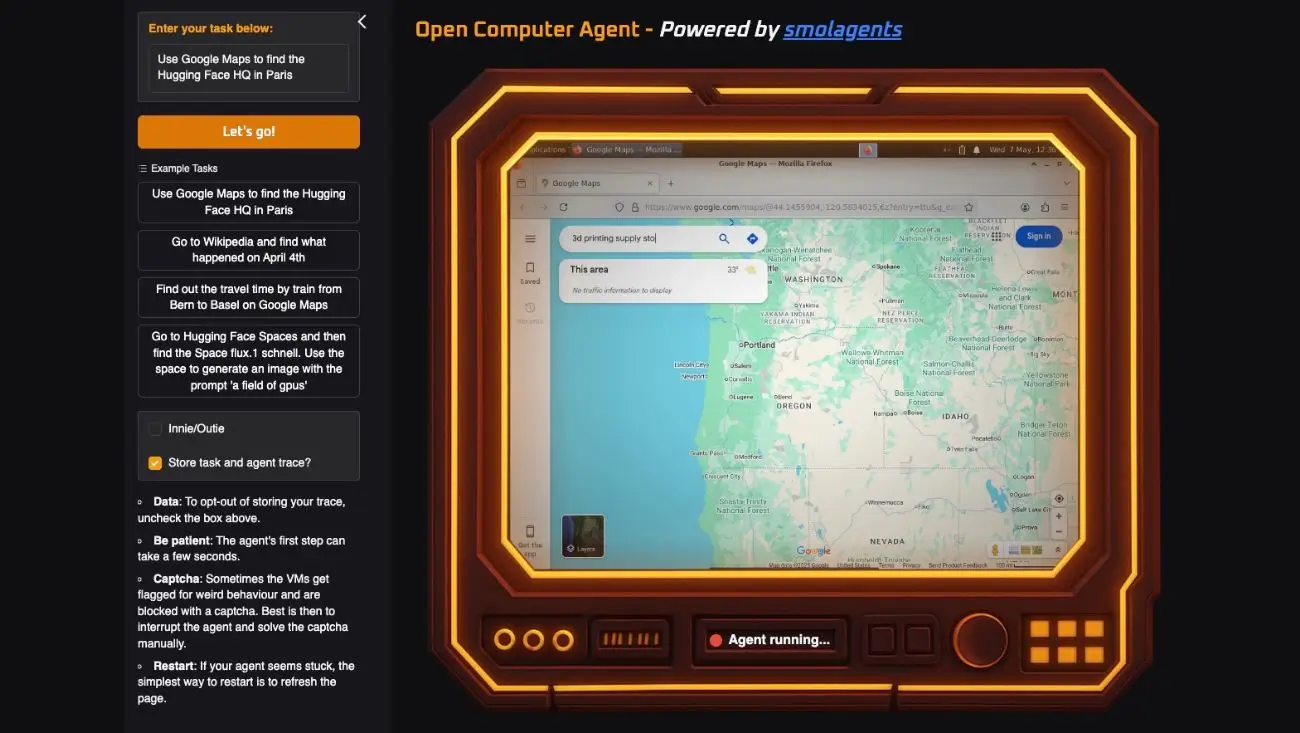Hugging Face has introduced a transformative AI tool called Open Computer Agent, which can browse the web, fill out forms, and perform computer tasks without any manual input. This free, cloud-based agent aims to streamline digital interactions by automating repetitive tasks, potentially revolutionizing accessibility and productivity. However, as AI agents gain traction, Open Computer Agent’s experimental status and limitations raise questions about its readiness for widespread adoption and the broader implications of such technology.
We’re launching Computer Use in smolagents! 🥳
-> As vision models become more capable, they become able to power complex agentic workflows. Especially Qwen-VL models, that support built-in grounding, i.e. ability to locate any element in an image by its coordinates, thus to… pic.twitter.com/mI8MuWZkIS
— m_ric (@AymericRoucher) May 6, 2025
Open Computer Agent operates within a Linux virtual machine, equipped with tools like the Mozilla Firefox browser, and is powered by the Qwen2-VL-72B vision-language model. It can identify on-screen elements by their coordinates, enabling it to click buttons, type text, and navigate multi-step processes. For example, a user can instruct the agent to “search for directions to Hugging Face HQ in Paris,” and it will open Firefox, access Google Maps, input the query, and display the route—all hands-free. Aymeric Roucher from Hugging Face’s agents team shared on X that advancements in vision models are enabling more complex workflows, a trend seen in other AI automation tools, such as Google’s Gemini AI, which enhance user accessibility.
The tool’s potential is significant, particularly for accessibility and productivity. It could empower individuals with disabilities by offering a hands-free way to navigate the web, from filling out forms to booking tickets. Businesses might also benefit by automating repetitive tasks like data entry or customer support queries, saving time and resources. Unlike OpenAI’s Operator, which inspired its design, Open Computer Agent is free to use, making it more accessible to a wider audience, much like how AI language tools have made education more inclusive by supporting diverse learners.
Despite its promise, Open Computer Agent faces notable challenges. Tests by The Decoder revealed accuracy issues, such as the agent searching for a “3D printing supply store” when asked to locate Hugging Face’s HQ, highlighting its inconsistency. The tool also suffers from slow performance, with users often waiting in a virtual queue due to high demand. Complex tasks like handling CAPTCHAs or booking flights remain unreliable, a problem echoed in other AI accessibility challenges, where tools struggle to deliver consistent results. Additionally, the agent requires a stable internet connection, which may exclude users in rural or low-income areas, a recurring issue in cybersecurity discussions about equitable tech access.
Privacy concerns also loom large. Open Computer Agent logs user requests by default to improve its technology, though users can opt out. This practice raises questions about data security, especially given recent AI privacy scandals involving improper data handling. Hugging Face is working to address these issues by refining the agent’s accuracy, speeding up performance, and exploring ways to make it more inclusive. The team aims to showcase the potential of open AI models, which are becoming more efficient to run on cloud infrastructure, potentially paving the way for broader applications in fields like education or healthcare.
If Open Computer Agent can overcome its current hurdles, it could set a new standard for AI agents, much like how AI hardware innovations are shaping the future of augmented reality. For now, it serves as a proof of concept, demonstrating how AI can simplify digital tasks while highlighting the need for further development. What do you think about an AI that can browse the web for you—could this redefine digital accessibility? Share your thoughts in the comments—we’d love to hear your perspective on this innovative tool.







